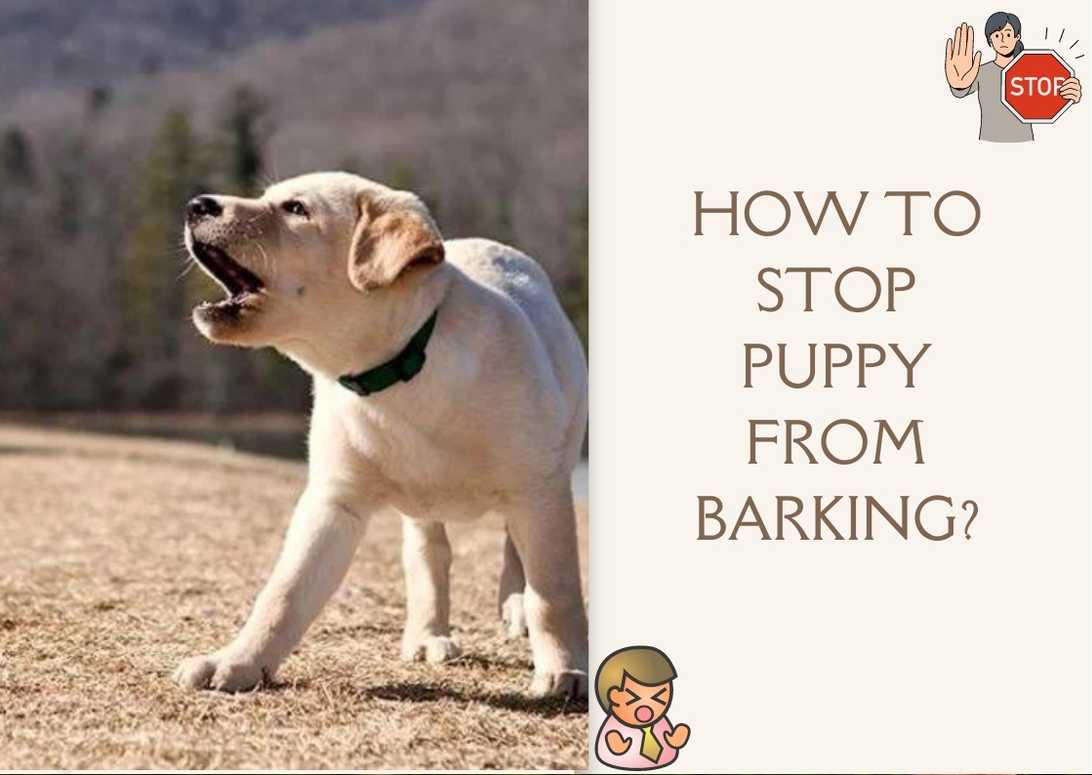How To Stop Puppy From Barking?
Hey there! Are you tired of your adorable little pup barking up a storm all the time? Well, fret not, because I’m here to help you put an end to that incessant noise.
In this article, we’re going to explore some effective strategies on how to stop a puppy from barking.
Communication is key when it comes to curbing excessive barking, and it’s not just about words. We’ll dive into the importance of using the right tone of voice and body language to effectively convey your message to your furry friend.
Plus, consistency is crucial in training, so we’ll discuss how sticking to a routine can make a world of difference.
And let’s not forget about positive reinforcement! We’ll delve into how rewarding good behavior can go a long way in teaching your puppy when it’s appropriate to bark and when it’s time for some peace and quiet.
So if you’re ready to create a serene environment for both you and your four-legged companion, let’s get started on this journey towards stopping that constant barking once and for all!
Important Points
- Use positive reinforcement and consistency in training to stop a puppy from barking.
- Create a calm environment and reduce environmental triggers that may cause barking.
- Provide mental stimulation through puzzle toys and interactive feeding to prevent boredom-related barking.
- Utilize scents with calming properties, such as lavender or chamomile, to create a relaxing atmosphere and reduce anxiety-related barking.
How to Communicate Effectively
To communicate effectively with your puppy and stop them from barking, remember to use a calm tone of voice and confident body language. Nonverbal cues play a significant role in conveying your message to your furry friend. When speaking to them, maintain a soothing tone that exudes confidence and assertiveness. Avoid yelling or using harsh words as it may only escalate their barking behavior.
Additionally, pay attention to your body language. Stand tall and avoid any signs of fear or anxiety, as dogs are highly perceptive to these cues. By establishing clear boundaries through consistent communication, you can help your puppy understand when it’s appropriate to bark and when it’s not.
Building trust is crucial in effective communication with your puppy. Take the time to bond with them through positive reinforcement techniques such as treats and praise for good behavior. Understanding their body language is also essential as it allows you to decode their needs and emotions more accurately. Actively listen to what they’re trying to communicate through their actions and respond accordingly.
By focusing on these aspects of communication, you can establish a strong connection with your puppy while reducing excessive barking behaviors.
Reducing environmental triggers without writing ‘step’, create a calmer atmosphere for your puppy by minimizing exposure to potential triggers that might cause them to bark excessively.
Reduce Environmental Triggers
Avoiding environmental triggers can help calm your furry friend and create a peaceful atmosphere in which they’re less likely to bark. One effective way to reduce environmental triggers is by using noise blocking techniques. You can close windows and doors, use white noise machines or calming music to drown out loud noises from outside.
Creating a calm environment indoors is also important. Make sure your puppy has a comfortable and quiet space where they can relax. Provide them with a cozy bed, toys, and maybe even a crate if they feel secure in it.
By minimizing external disturbances and creating a soothing environment, you can help your puppy feel more at ease and reduce the likelihood of excessive barking.
In addition to noise blocking techniques and creating a calm environment, socialization strategies play an important role in reducing barking behaviors. Exposing your puppy to different people, animals, and environments from an early age can help them become more confident and less reactive to new stimuli. Gradually introduce them to various situations, such as walks in busy areas or visits to parks where they can interact with other dogs.
Redirecting attention is another effective strategy for managing barking. If you notice that your puppy starts barking due to excitement or frustration, redirect their focus onto something else. Offer them a toy or engage them in an activity that requires mental stimulation, such as puzzle toys or obedience training exercises.
By implementing these techniques for reducing environmental triggers like noise, creating a calm environment, practicing socialization strategies, redirecting attention when needed, and managing separation anxiety if applicable, you can effectively address excessive barking in puppies while promoting their overall well-being without causing distress or resorting to punitive measures like yelling or scolding.
Now let’s move on to the next section about providing mental stimulation for your pup.
Provide Mental Stimulation
Creating opportunities for mental stimulation is a key factor in keeping your furry friend engaged and content. Puzzle toys are a great way to challenge your puppy’s mind and keep them occupied. These toys require problem-solving skills and can provide hours of entertainment for your pup.
Nose work is another fantastic mental exercise for dogs. You can hide treats or toys around the house or yard, and encourage your puppy to use their nose to find them. This not only engages their senses but also taps into their natural instincts.
Interactive feeding is another method that can help reduce excessive barking. Instead of simply giving your puppy their food in a bowl, try using interactive feeding toys that make them work for their meal. This will not only keep them mentally stimulated but also prevent boredom-related behaviors, such as excessive barking.
Training games are also beneficial for mental stimulation. Teach your puppy new tricks or commands, and incorporate rewards such as treats or praise. This will engage their brain and help redirect their focus away from barking.
Enrichment activities, such as hiding treats in different areas of the house or setting up obstacle courses, can also provide mental stimulation for your pup. These activities encourage problem-solving skills and keep them entertained while reducing the likelihood of barking out of boredom. By providing these mental challenges and engaging activities, you can help curb excessive barking by keeping your puppy’s mind occupied.
Transition: Now that we’ve discussed ways to provide mental stimulation, let’s address regular situations that may trigger barking without writing ‘step’.
Address Regular Situations
In everyday scenarios, it’s important to acknowledge and address the situations that commonly trigger your pup’s barking. By establishing routines, you can help your puppy feel more secure and reduce their need to bark. Dogs thrive on consistency and structure, so having a regular schedule for feeding, walks, playtime, and rest will help them feel more at ease.
Additionally, crate training benefits both you and your puppy when it comes to managing their barking. A crate provides a safe and comfortable space where they can retreat when they feel overwhelmed or anxious. It also helps prevent excessive barking by giving them a designated area where they can relax without being overstimulated.
Socialization techniques are another essential aspect of addressing regular situations that may trigger your puppy’s barking. Exposing them to different environments, people, and animals from an early age will help them become more confident and less likely to bark out of fear or insecurity. Gradually introduce them to new experiences in a positive manner, rewarding calm behavior with treats or praise.
Managing separation anxiety is also crucial in preventing excessive barking when you’re away from home. Start by leaving your pup alone for short periods of time and gradually increase the duration as they become more comfortable being alone. Provide toys or puzzles that can keep them occupied while you’re away.
Consistency in training methods is key when addressing regular situations that cause your puppy to bark excessively. Use positive reinforcement techniques such as treats or verbal praise to reward quiet behavior rather than scolding or punishing them for barking. This will help reinforce the idea that being quiet is desirable while maintaining a positive relationship with your furry friend.
With these strategies in place, you can effectively address everyday situations that trigger your puppy’s barking and create a calmer environment for both of you.
Now let’s move on to teaching the ‘quiet’ command as another effective way to stop excessive barking without resorting to yelling or punishment tactics.
Teach Quiet Command
By teaching your furry companion the ‘quiet’ command, you’ll be able to bring harmony to your home and put a muzzle on their excessive yapping. Effective communication techniques are key when training your puppy to be quiet. Use a firm but calm tone of voice, along with clear hand signals, to convey your expectation for them to stop barking.
Consistency is crucial in reinforcing this command, so make sure everyone in the household uses the same cues and responses.
To effectively teach the ‘quiet’ command without environmental triggers, create controlled situations where you can address your puppy’s barking tendencies. For example, have someone ring the doorbell or play recordings of common sounds that trigger their barking. As soon as they start barking, use a calm yet assertive voice to say ‘quiet’ and immediately redirect their attention with a toy or treat. This helps them associate being quiet with positive rewards.
In addition to specific training exercises, mental stimulation is also important for curbing excessive barking in puppies. Engage them in interactive games and provide puzzle toys that keep their minds occupied. A tired puppy is less likely to bark out of boredom or frustration.
Moving forward into the next section about using positive reinforcement methods, it’s essential to stay patient and consistent throughout the training process. Remember that yelling or punishment will only confuse your puppy and may even exacerbate their barking behavior. Instead, focus on rewarding moments of silence with praise and treats. With time and dedication, your furry friend will learn that being quiet brings positive outcomes and will become more responsive to the ‘quiet’ command overall, leading to a decrease in their barking behavior.
Use Positive Reinforcement
To effectively teach your furry friend the ‘quiet’ command, you’ll need to focus on positive reinforcement methods. This means rewarding your puppy for being quiet rather than punishing them for barking. Here are some strategies that can help:
- Treat rewards: Whenever your puppy stops barking on command, immediately give them a treat as a reward. This will reinforce the behavior and motivate them to continue being quiet in the future.
- Clicker training: Use a clicker to mark the moment your puppy stops barking. Pair this with a treat reward to create a positive association with being quiet.
- Verbal praise: Along with treats and clicker training, use verbal praise such as saying “good quiet”or “well done”when your puppy obeys the ‘quiet’ command.
- Play rewards: Incorporate playtime as another form of positive reinforcement. After your puppy successfully stays quiet, engage in their favorite game or give them access to their favorite toy.
Consistency and patience are key when using positive reinforcement techniques. It may take time for your puppy to fully understand and obey the ‘quiet’ command, so be patient and keep practicing regularly. By utilizing these methods, you can teach your dog to be quieter and more obedient.
Now let’s move on to how we can utilize scent as a deterrent without causing any harm or discomfort to our furry friends.
Utilize Scent as a Deterrent
Harnessing the power of scents can be a delightful and effective way to discourage excessive noise from our furry companions. Aromatherapy methods, such as using natural deterrents and scent-based training techniques, can help redirect a puppy’s barking behavior.
One option is to explore essential oil solutions that are known for their calming properties. Lavender, chamomile, and bergamot are just a few examples of essential oils that can create a soothing environment for your puppy. By diffusing these scents in the areas where your puppy spends most of its time, you can create a calming atmosphere that may reduce their urge to bark unnecessarily.
Another way to utilize scent as a deterrent is by using calming scents directly on your puppy’s bedding or toys. Applying a small amount of lavender or chamomile essential oil onto their belongings can help create an association between the scent and relaxation for your pup. This technique can be especially helpful during crate training or when leaving your puppy alone at home.
The familiar scent of calmness may provide them with comfort and security, reducing anxiety-related barking episodes. Just remember to use essential oils safely and in moderation, as some scents can be overwhelming for dogs if used excessively. With patience and consistent use of calming scents, you may find that your puppy’s barking becomes less frequent over time.
Frequently Asked Questions
How long does it typically take to see results when using positive reinforcement to train a puppy to stop barking?
Positive reinforcement can be highly effective in training puppies to stop barking. The training duration varies depending on the individual puppy and their breed-specific barking tendencies. It’s important to explore alternatives to bark collars and address any separation anxiety issues during the training process.
Are there any specific breeds that are more prone to excessive barking, and if so, how can their training be adjusted?
Specific breeds, such as Terriers and Beagles, may be more prone to excessive barking due to their genetic predisposition. Training adjustments can include increased mental stimulation, positive reinforcement techniques, and addressing any underlying separation anxiety issues.
Can using a bark collar be an effective solution to stop a puppy from barking, or are there better alternatives?
Using a bark collar may seem like an easy fix, but let’s explore its effectiveness. Positive reinforcement training techniques and behavioral adjustments for specific breeds prone to barking are better alternatives. Addressing separation anxiety and using natural calming supplements can also help.
Is it possible for a puppy to develop excessive barking habits as a result of separation anxiety, and how can this be addressed?
Yes, puppies can develop excessive barking habits due to separation anxiety. Signs include persistent barking when alone, destructive behavior, and restlessness. Behavior modification techniques, creating a comforting environment, and seeking professional help are recommended for addressing this issue.
Are there any natural remedies or supplements that can help calm a puppy and reduce their tendency to bark excessively?
There are natural remedies and puppy calming supplements available to help reduce excessive barking. Along with behavioral training techniques, these can be effective in addressing triggers that lead to excessive barking in puppies.
Conclusion
In conclusion, stopping a puppy from barking requires more than just words; it demands a deep understanding of communication and a commitment to consistency. By utilizing the power of tone of voice and body language, we can effectively convey our expectations to our furry companions.
But that’s not all – we must also create an environment that minimizes distractions and provides ample mental stimulation.
Imagine a world where your puppy stops barking incessantly, where peace and harmony reign supreme. With the right techniques, you can make this dream a reality. From addressing regular situations to teaching the quiet command, every step taken brings you closer to blissful silence.
And don’t forget the power of positive reinforcement – by rewarding desired behavior, you will witness miracles unfold before your eyes.
But wait! There’s more! Scent can be your secret weapon in curbing excessive barking. Imagine spraying a scent that deters your puppy from barking altogether – it’s like magic!
So take charge today and embark on this journey towards tranquility with your adorable four-legged friend. Together, you can conquer the world of excessive barking and create an unbreakable bond that lasts a lifetime.







